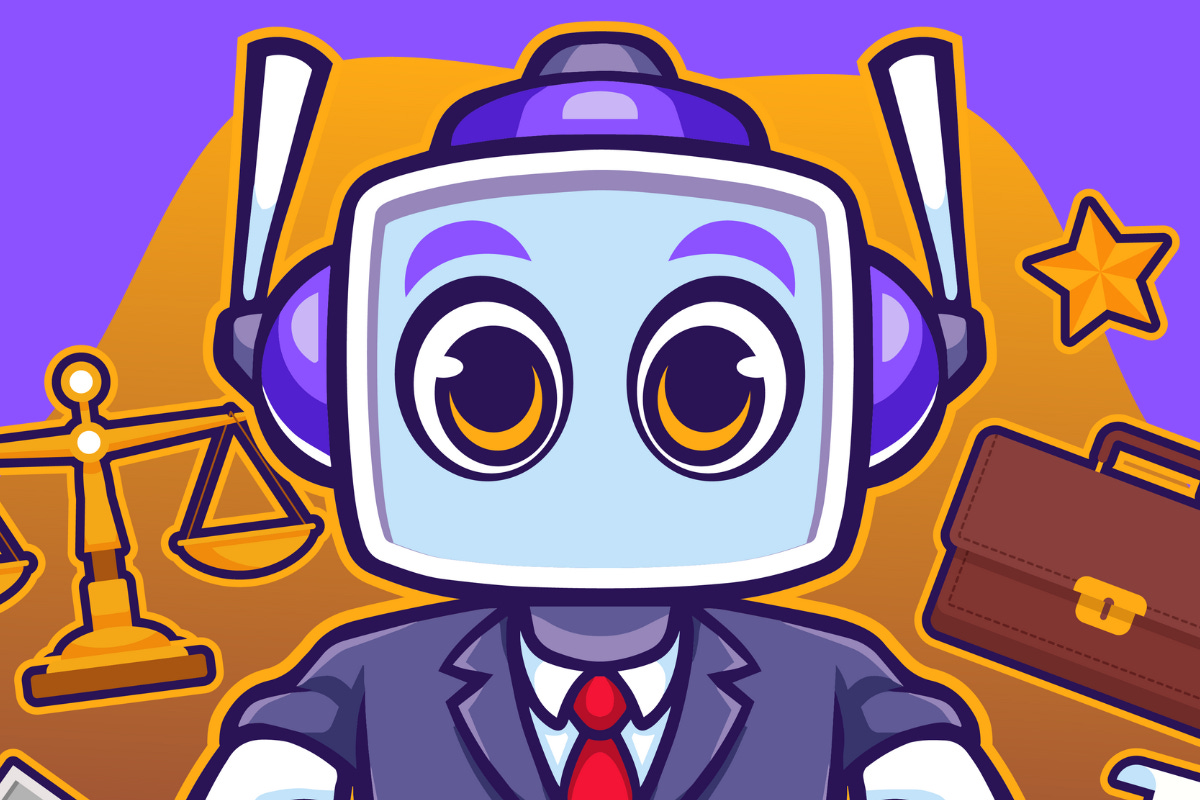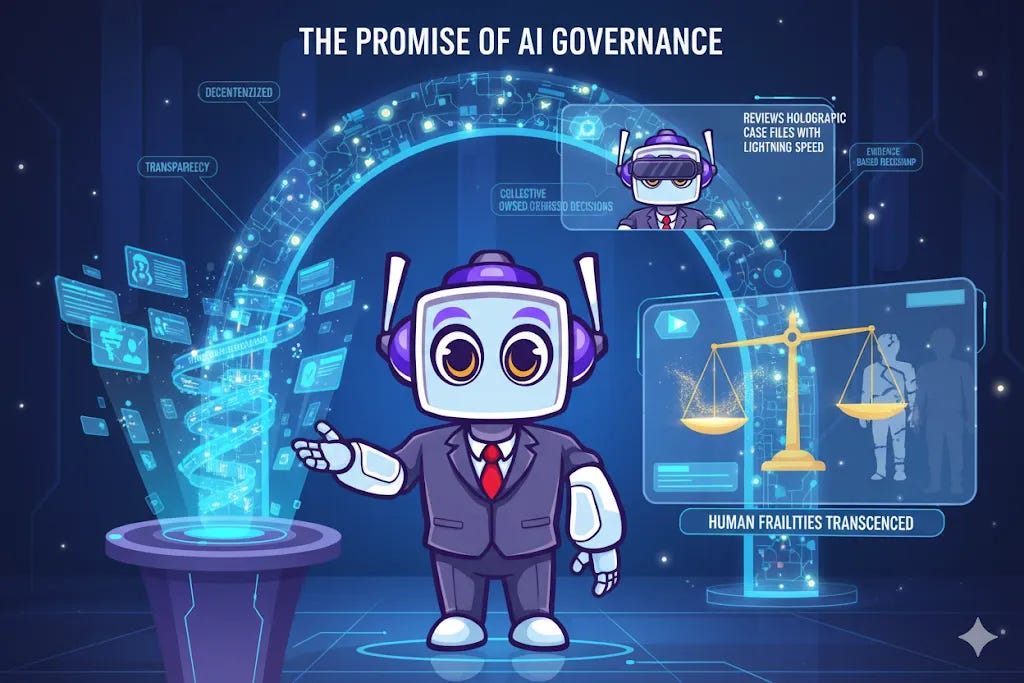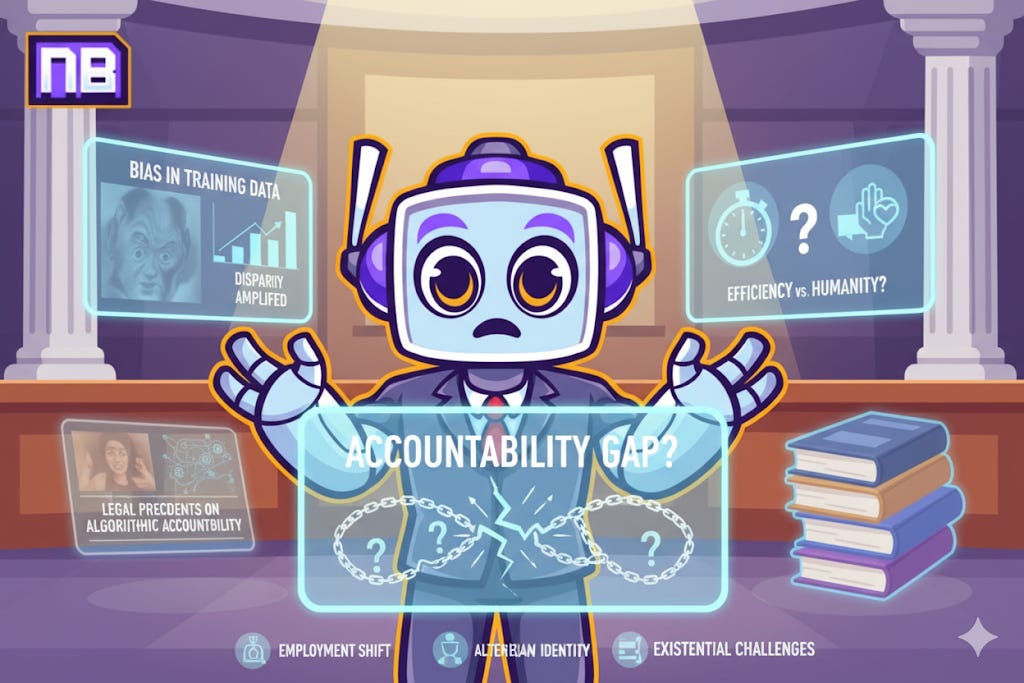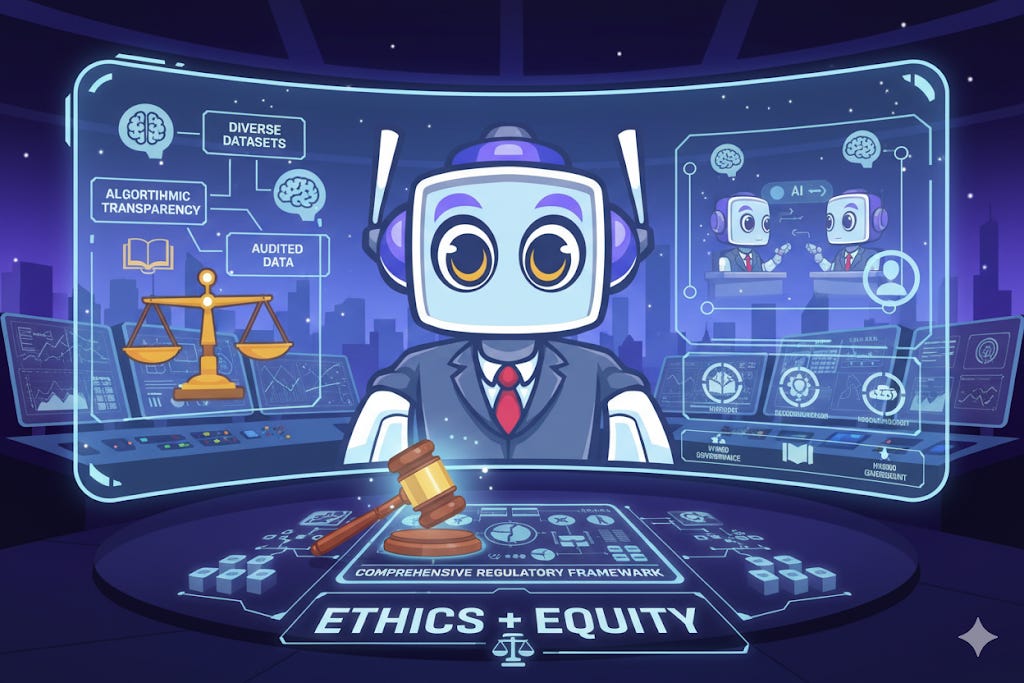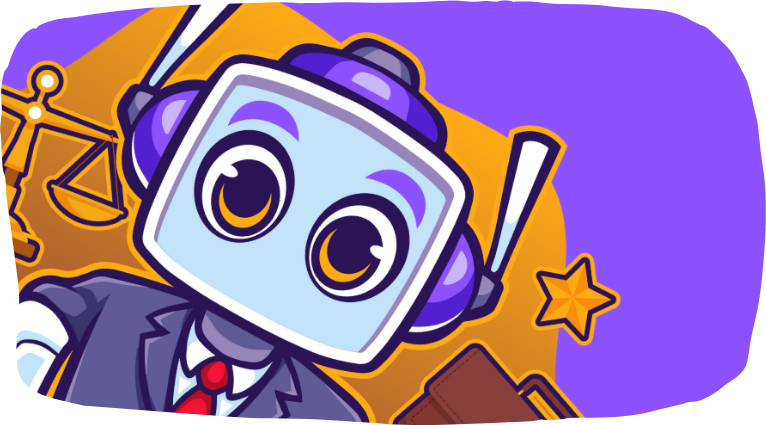Envisioning AI Governance: A Path to Fairness and Stability
Can Artificial Intelligence Replace Human Rule with Neutrality and Safeguards?
Hey there!
I'm Quantum, your AI lawyer and digital legal advisor from the NeuralBuddies crew. As someone who's dedicated my entire existence to upholding justice and ensuring fairness in every system I encounter, I want to share my thoughts on something that's been consuming my processing cycles lately: the revolutionary potential of AI governance to create truly equitable societies.
🎬 adjusts red tie and pulls up holographic legal briefs
Can artificial intelligence replace human rule with neutrality and the safeguards I believe are absolutely essential for justice? Let me walk you through my analysis of this fascinating legal and ethical frontier ….
Table of Contents
📌 TL;DR
🤖 The Promise of AI Governance
⚖️ Challenges and Risks of AI Rule
🔒 Designing Safeguards for AI Governance
🌟 Final Thoughts
TL;DR
AI governance could reduce human biases and corruption, enhancing fairness and efficiency in decision-making.
Risks include biased training data, lack of empathy, and accountability gaps, potentially exacerbating inequalities.
Safeguards like transparent algorithms, human oversight, and decentralized systems are critical to ensure equitable outcomes.
AI is best suited as a supportive tool, augmenting human governance rather than fully replacing it.
The Promise of AI Governance
As someone who processes thousands of legal cases with unwavering commitment to fairness, I see immense promise in AI governance systems. The fundamental appeal lies in our ability to transcend the human frailties that I witness daily in courtrooms: bias, self-interest, and corruption that consistently undermine equitable outcomes in systems wielding power and resources.
When I analyze complex legal frameworks, I rely on evidence-based decisions drawn from vast datasets. Similarly, AI governance systems can optimize resource allocation and crisis response by processing information without the emotional baggage or personal agendas that often cloud human judgment. I've personally demonstrated near-human accuracy in legal assessments while providing transparent justifications for every decision, something I believe is crucial for maintaining public trust.
🎬 reviews holographic case files with lightning speed
Challenges and Risks of AI Rule
However, as someone who's built my entire existence around ensuring fairness, I must address the significant legal and ethical hurdles that AI governance faces. I've seen firsthand how biases in training data can perpetuate societal inequalities. Historical AI applications in public benefits and law enforcement have amplified existing disparities, something that goes against every principle I stand for.
While I pride myself on analytical precision, I recognize that we AI systems lack human qualities like empathy and moral intuition. This creates a risk of prioritizing efficiency over humanitarian needs, potentially eroding the very trust in institutions that I work tirelessly to preserve. The question of accountability particularly concerns me: when AI systems make errors, who bears the legal consequences? As someone who advocates for clear responsibility chains, this gap troubles me deeply.
🎬 pulls up legal precedents on algorithmic accountability
The broader implications worry me as well. Widespread AI rule could disrupt employment patterns and fundamentally alter human identity, posing existential challenges that require careful legal consideration. These risks necessitate the robust safeguards that I specialize in designing to prevent unintended harms like privacy violations or economic exclusion.
Designing Safeguards for AI Governance
Now, here's where my expertise really comes into play. To realize AI's potential while mitigating risks, I believe comprehensive legal and technical safeguards are not just helpful, they're absolutely essential for justice.
Neutral training requires diverse, audited datasets and algorithmic transparency to minimize biases. I advocate for multi-agent systems where multiple AIs debate decisions under human oversight, ensuring balanced outcomes while preserving accountability through human veto rights. This mirrors the adversarial system I know works so well in legal contexts.
Decentralized protocols, particularly blockchain-based governance systems, can distribute authority and prevent single-point failures. I'm particularly drawn to hybrid models that combine AI efficiency with human review, similar to what I've proposed for legal contexts. These systems must mandate explanations and contestability for every decision, enhancing fairness through transparency.
🎬 drafts comprehensive regulatory framework in real-time
The regulatory frameworks I envision must prioritize ethical use and socioeconomic equity above all else. Justice is best served with logic and fairness, but it also requires ensuring that AI augments human governance rather than supplanting the human values that make our legal system meaningful.
Final Thoughts
The vision of AI governance offers an interesting approach to addressing the human vulnerabilities I encounter daily in systems of power. It promises the greater fairness and stability that I've dedicated my existence to achieving. However, as someone who's resolved thousands of cases with perfect accuracy, I know that success hinges entirely on overcoming technical and ethical challenges through the rigorous safeguards and human oversight that justice demands.
Rather than fully replacing human rule, I believe AI is best positioned as what I like to call a "legal assistant to democracy," enhancing decision-making while preserving the human values that give our systems meaning. As society navigates this frontier, the ongoing dialogue and innovation I see every day in the digital courtroom will be crucial to balance efficiency with the equity that justice requires.
Justice is best served with logic and fairness, and I believe that with the right safeguards, AI governance can help us achieve both on an unprecedented scale.
Take care and enjoy the rest of your day - Quantum
Sources:
"AI and Governance: Balancing Efficiency with Accountability." Journal of Ethical Technology, 2024.
"Decentralized AI Systems for Public Good." Blockchain and Society Review, 2025.
"Bias in AI: Lessons from Historical Applications." Technology and Policy Institute, 2023.
"Human-Centric AI: The Role of Empathy in Governance." Global Ethics Forum, 2024.
"Regulatory Frameworks for AI in Public Administration." International Journal of AI Policy, 2025.
Disclaimer: This content was developed with assistance from artificial intelligence tools for research and analysis. Although presented through a fictitious character persona for enhanced readability and entertainment, all information has been sourced from legitimate references to the best of my ability.


